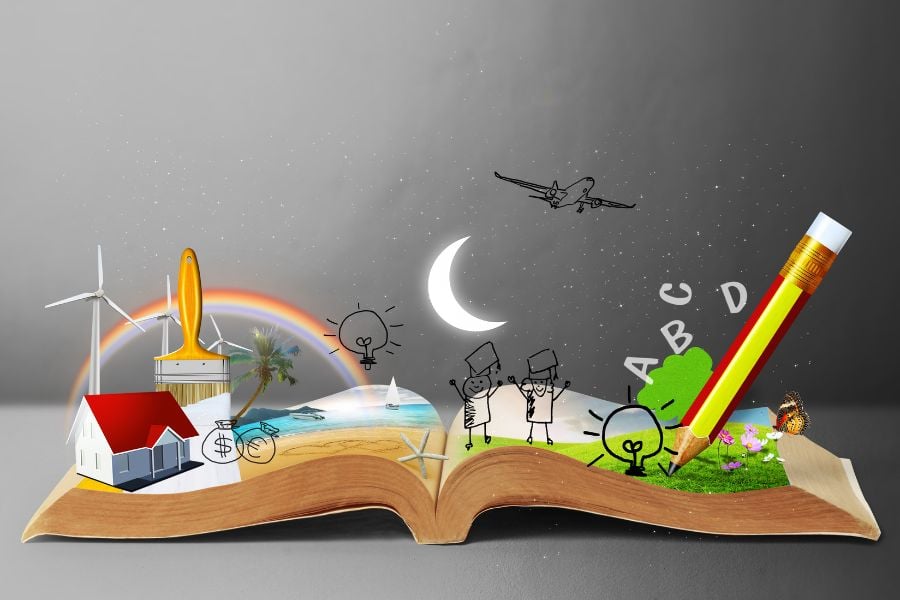Understanding the complex world of B2B and B2C can feel like learning a new language.
But don’t worry — you’ve landed in the right place to decipher these codes.
In this post, we’ll dissect the fundamental differences between the two, explore examples, and offer actionable strategies to nail your approach for both.
So whether you’re a seasoned entrepreneur or a newbie dipping your toes into the corporate waters, we’ve got something for you.
Ready to dive into the riveting realm of B2B vs B2C?
Let’s dive right in.

Demystifying the Jargon of B2B and B2C
B2B and B2C: if you’ve spent any amount of time in the business world, you’ve likely come across these acronyms. But what exactly do they mean?
B2B, or business-to-business, refers to companies that primarily sell products or services to other businesses.
Think of an industrial manufacturer selling machinery to a construction company, or a software development firm providing a productivity tool to other businesses.
LinkedIn is a perfect example of a B2B platform where professionals connect, collaborate, and even find new opportunities.
On the flip side, B2C, or business-to-consumer, describes companies that sell directly to the end consumer.
These are the brands you interact with on a daily basis, like Starbucks selling you your morning cup of coffee or Amazon delivering your latest impulse buy.
But why does it matter whether a company operates in a B2B or B2C manner?
The answer lies in the way they approach marketing, sales, customer service, and even product development.
For example, B2B companies typically focus on logical process-driven purchasing decisions, while B2C companies often target emotional decision-making processes.
Or a B2B company might prioritize features and efficiency, whereas a B2C company might emphasize benefits and lifestyle enhancement.
Simply put, knowing whether you’re dealing with a B2B or B2C environment can help shape your business strategy.
It’s like knowing the rules of the game — you’re much more likely to score a win if you understand how the game is played.
So, What are the Key Differences Between B2B and B2C?

Now, how do these two different environments impact the strategies and operations of businesses?
Let’s dissect the key differences…
1. Target Audience Characteristics
B2B and B2C businesses don’t just differ in their direct customers; they also vary in target audience characteristics.
In B2B, we’re often dealing with a group of decision-makers within an organization. Their focus? Functionality and return on investment (ROI).
B2C customers, on the other hand, are typically individuals motivated by personal needs, desires, and emotional triggers.
They want to satisfy their individual cravings, not necessarily justify a spreadsheet of benefits.
2. Products & Services Offered
The type of products or services offered in B2B and B2C also differ significantly.
B2B products are often complex, requiring technical knowledge and understanding. Think of complex machinery or enterprise software systems.
B2C products are generally simpler and designed for individual consumption, like a bottle of soda or a novel.
Knowing the difference in this area influences everything from product development to marketing and sales strategy.
3. Different Approaches to Sales

Sales in B2B often involve nurturing long-term relationships, with multiple interactions before a purchase.
It’s more of a marathon, not a sprint. B2C sales, on the other hand, are usually transactional and driven by impulsive decisions, hence the emphasis on persuasive and emotive advertising.
So, whether you’re in a boardroom or a supermarket, your sales approach needs to be tailored to your environment.
4. Buyer Considerations
What buyers consider before making a purchase differs in B2B and B2C.
B2B buyers are concerned with efficiency, ROI, product longevity, and vendor credibility.
In contrast, B2C buyers are influenced by price, brand reputation, product reviews, and personal taste.
Understanding these key considerations can be the difference between a sale and a missed opportunity.
5. Decision-Making Process
Ever heard of a B2B purchase happening in a day? Unlikely.
B2B’s decision-making process often resembles a long, winding road, fraught with several key stakeholders, multiple touchpoints, and a complex web of considerations.
Think about it: does the company have the budget? Will the product improve operations? Is the vendor reliable?
On the flip side, B2C decisions are usually much quicker. B2C consumers see a product they like, check a few reviews, and voila! The deal is done.
In other words, patience and persistence are key in B2B, while timeliness and appeal win the day in B2C.
6. Branding & Positioning

B2B branding often focuses on reliability, trust, and value proposition. It’s all about painting a picture of a trusted partner who can deliver results.
But for B2C, it’s about connecting on a personal and emotional level, creating a story that resonates with the consumer’s lifestyle or aspirations.
Think of the sleek and innovative image of Apple versus the reliable and professional branding of IBM. Both are powerful, but very different messages.
7. Audience Targeting
When it comes to marketing, B2B usually targets a niche market with a specific set of needs.
This involves precision targeting and personalized messaging. B2C marketing, however, is often about reaching a broad audience, creating mass appeal through emotional and aspirational messaging.
In a nutshell, it’s a sniper versus shotgun approach.
8. Ad Copy Strategies
B2B ad copy often utilizes industry jargon and focuses on the product’s technical aspects and benefits to appeal to an informed, professional audience.
It’s about showing mastery and understanding of the sector. On the contrary, B2C ads lean heavily on emotions, storytelling, and lifestyle appeals to grab attention and entice consumers.
Ever noticed the difference between an ad for a cloud computing service and one for a new perfume? It’s like night and day!
9. Building Customer Relationships

When it comes to customer relationships, B2B is more like a marathon, while B2C is more akin to a sprint.
In B2B, it’s about fostering long-term relationships based on trust and mutual growth. This can take time and requires continuous communication and service.
On the flip side, B2C relationships can be more transactional: a consumer chooses a product, buys it, uses it, end of story.
However, smart B2C companies know that repeat business is the key to success, so they’re also investing in building strong bonds with customers.
10. Customer Engagement
Customer engagement looks different in B2B and B2C.
In B2B, it’s about providing valuable industry insights, offering robust customer support, and being a partner rather than just a vendor. Webinars, white papers, case studies — these are the tools of the B2B engagement trade.
In contrast, B2C customer engagement might look like interacting with followers on social media, running fun contests, or personalizing email marketing campaigns.
Think sponsored posts on Instagram versus LinkedIn’s industry reports.
11. Customer Service
Customer service is vital in both B2B and B2C, but the execution differs.
B2B customer service often involves dedicated account managers, technical support teams, and in-depth product training. It’s about being there for the customer, providing expert assistance when they need it.
For B2C, customer service is more about providing timely responses, easy return policies, and ensuring a smooth purchasing process.
The goal is to keep the customer happy and make their interaction with the company as seamless as possible.
B2B vs B2C: Which is Better? Choosing the Right Approach for Your Business

“Which is better, B2B or B2C?” That’s like asking if apples are better than oranges.
There’s no ‘one size fits all’ when it comes to B2B and B2C. Is one better than the other? Not necessarily. It’s all about what fits your business best.
It’s not about better or worse, it’s about what fits your business model, products or services, and target audience.
If your product or service is specialized, catering to specific industries or business needs, B2B could be your ticket.
Here, you’re looking at larger transactions, long-term relationships, and the opportunity to become a trusted partner for your clients.
Your key to success? Expertise, reliability, and stellar customer service.
On the flip side, if your offerings appeal to a broad consumer base, B2C is your arena.
Here, emotions rule, and customer experience is king. It’s about grabbing attention, making that emotional connection, and making the buying process as smooth as possible.
But why box yourself in?
Many businesses thrive using a hybrid B2B and B2C model.
Think about Apple: they’re masters in the B2C market, but they also have a robust B2B offering for businesses, schools, and government organizations.
So, don’t ask which is better — ask which is right for your business. Or better yet, explore how you might succeed in both worlds.
After all, in the world of business, adaptability is the name of the game.
Practical Tips & Tricks to Optimize Your B2B & B2C Marketing Strategies

Marketing, whether B2B or B2C, isn’t about throwing everything at the wall and hoping something sticks.
It’s about strategic moves, understanding your audience, and delivering what they need — and then some. For example…
B2B Marketing Tips & Tricks
- Tap Into Your Expertise: You’re not just selling a product or service; you’re selling expertise. Leverage your industry knowledge and share it through thought leadership content such as blogs, webinars, or eBooks. Be the go-to resource in your niche.
- Build Trust with Testimonials: Testimonials and case studies can work wonders in the B2B world. They offer proof of your claims and build trust. Don’t be shy to ask your satisfied customers for them.
- Networking and Partnerships: Remember, B2B is a smaller pond. Industry events, online forums, and partnerships can help you rub elbows with the right people and get your brand noticed.
B2C Marketing Tips & Tricks
- Emotional Appeal: Humans are emotional creatures. We don’t just buy products; we buy stories, experiences, and connections. Make sure your marketing materials resonate emotionally with your audience.
- Optimize for the Customer Journey: From discovery to purchase, make every step a breeze. Optimize your website for usability, provide top-notch customer support, and streamline your checkout process.
- Personalization is Key: B2C customers appreciate feeling unique. Utilize customer data to provide personalized recommendations, offers, and communication. It makes them feel special, and who doesn’t like that?
Whether you’re in the B2B or B2C game (or both), effective marketing boils down to knowing your audience and meeting them where they are.
It’s about delivering value, fostering trust, and creating an experience that keeps them coming back for more.
Remember, it’s not just about making a sale; it’s about building a relationship.
Ready to Master B2B vs B2C?

Now, that’s a wrap on B2B vs B2C!
Look how far you’ve come, diving deep into the intricate dance between both business models, armed with actionable strategies and fresh perspectives.
It’s a wild ride, but you’re in the driver’s seat.
Hold your head high, embrace the future, and keep turning those insights into actions!



